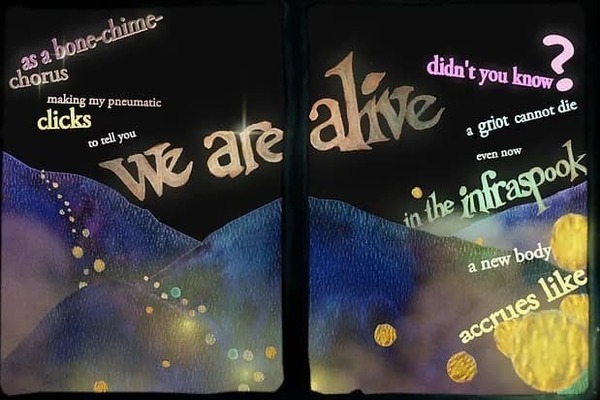
"Coming closer we might find that Solaris isn't a planet at all, but a fugitive surface—a 'fictive copy' illegible as a speculative ecological fiction alone. I consider instead that this complex of readings, and maybe Solaris itself, form an assemblage, and a model for Black artistic expression—an expression that sees a connection between the treatment of politically marginalized bodies, and of the nonhuman world; because the ways we ask our technology and our environment to labor, and to mediate the violent apparatuses of the state that pass through them, that use them, is connected to the ways we ask politically marginalized bodies to labor and to mediate, perhaps like Solaris, the violences they are made to be complicit with."
— from Madison McCartha's "Notes toward a Virtual Poetics: An Essay on Solaris, Assemblage, and Blackness"
Madison McCartha is a poet, critic, and multimedia artist whose debut book of poetry and visual art, Freakophone World, was published by Inside the Castle in 2021. McCartha's writing appears in Black Warrior Review, BOMB, Denver Quarterly, jubilat, The Spectacle, and elsewhere. Their work has been exhibited through the Lower Manhattan Cultural Center, the Poetic Research Bureau, and digitally through Small Press Traffic. Shortlisted for the 2019-2021 CAAPP Creative Writing Fellowship, they have received support from The Electronic Literature Organization, Blue Mountain Center, Millay Arts, Winter Tangerine, and the Ucross Foundation.
John Keene (the MacArthur winning author of Counternarratives ) has called McCartha's debut a "marvel of continuous lyric transformation." Douglas Kearney (author of Sho) describes McCartha's poetic voice as "assured, inventive, irradiated," likening the speaker to a "chimera of grievance, sensuality, insight, and orneriness chucking the shit-talk of those who’ve been below long enough to know what’s been sown, where everything is buried." In a review of Freakophone World, Oliva Cronk and Philip Sorenson write:
"McCartha has written an erotics of bodies smashing together, of words colliding. These are not only “human” bodies. In fact, not human at all: this is about uncanny bio-flotillas, cadavers, trash, and technology: about getting outside of oneself, while still keeping one’s ability to speak: a talking wall, a grub, a slime mold, some kind of free-floating memory, or (possibly most especially) virtual reality. All of this, too, is predicated on and happening in ecological catastrophe: this is the erotics of collapsing ecosystems and the rise of squid-ruled seas."
— from Oliva Cronk and Philip Sorenson's "Madison MCartha's Freakophone World" (Tarpaulin Sky)

Remarking on the visual aspects of the book, Asiya Wadud (author of No Knowledge Is Complete Until It Passes Through My Body) writes, “In the paintings inside Freakophone World, there are moments where we enter a whole wilderness of longing, where McCartha invites us to reconsider the empirical limits of scale, scope and containment.” In their own words, McCartha compares the paintings of Freakophone World to "virtual diorama[s]" influenced by 70s sci-fi films and Detroit House music. One can read excerpts from Freakophone World as well as view McCartha's own kinetic films by visiting their website.
McCartha's second book, The Cryptodrone Sequence, is forthcoming from Black Ocean in 2025. They describe the book as a "simulation glitch, a cypher, a queer assemblage diary with a cutup persona—much like Kathy Acker’s Janey Smith from Blood and Guts in High School—an anarcho-punk-bot-tremor using as its source material a technical handbook on Computer Security Basics (circa 2002), as well as some chewed-up texts from Jean Genet, Édouard Glissant, Clarice Lispector, and others who together constitute this poetic intervention."
As a contributor to the Action Books Blog, McCartha has interviewed authors like Anaïs Duplan and Will Alexander. Their "Notes toward a Virtual Poetics" blog series was eventually published as a peer-reviewed essay by Catalyst: Feminism, Theory, Technoscience in 2022.
McCartha holds an MFA from the University of Notre Dame. As a PhD Candidate at the University of California, Santa Cruz, they investigate the ways media art and electronic literature might tell us something new about boundaries, permission, and race.